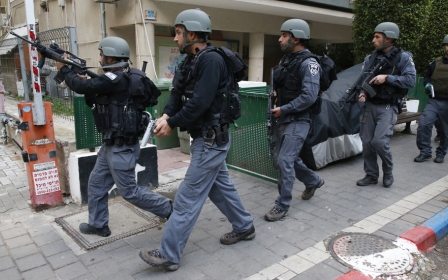Manhunt for suspected Tel Aviv shooter continues

Israeli security forces continued a manhunt on Saturday for the Palestinian citizen of Israel suspected of killing two people and wounding seven others at a Tel Aviv pub, with the motive still unknown.
The New Year's Day shooting came amid a wave of Palestinian attacks on Israelis and days after the leader of the Islamic State (IS) group threatened Israel with violence.
Police partially lifted a gag order on Saturday, naming the suspected shooter as Nashaat Melhem, 31, from the town of Arara in northern Israel. They distributed his picture and encouraged public vigilance.
Police spokesman Micky Rosenfeld said there was a "strong possibility that this was a terrorist attack but we haven't ruled out criminal motives".
Prime Minister Benjamin Netanyahu took a cautious tone in Saturday evening remarks at the site of the shooting, refraining from defining it as anything beyond a murder.
"There was a despicable murder here yesterday - incomprehensible cruelty," he said after lighting a candle outside the pub.
"Young people, whose entire lives were ahead of them, the ages of my own children, were innocently sitting celebrating a birthday and were murdered in cold blood."
Witnesses described scenes of chaos to Middle East Eye.
“A man came in to shout to us all to lie down on the floor, and then we heard two shots, one that went right into the window and the other into another area,” said Moran Shafer, who had been sitting at cafe with friends.
“Everyone suddenly pushed one another and tried to get down, the tables fell down and we tried to hide ourselves somehow behind the tables, or something else."
Netanyahu noted that security forces were working "around the clock to apprehend the murderer".
The shooting has been condemned by the city council of Arara as well as by the head of the Joint List, a group of the main Arab parties in Israel’s parliament.
Netanyahu praised "the condemnations of the crime from the Arab sector", while stressing he expected to hear such from "all Arab members of parliament".
He noted the existence of Arab Israeli "enclaves in which there is no law enforcement and in which there is Islamist incitement, rampant crime and illegal weapons that are frequently fired at events such as weddings".
He said he had formulated a plan to “dramatically increase law enforcement in the Arab sector".
"You can't say 'I'm an Israeli in my rights and a Palestinian in my duties' - whoever wants to be an Israeli has to be one all the way, in rights and duties, and the first duty is to obey the country's law," he stressed.
Arab Israelis are those who remained in the Jewish state after its 1948 creation, as well as their descendants. They account for more than 17 percent of the country's population.
They often complain of discrimination in various fields, including building permits, infrastructure and education.
Members of Melhem’s family told media that the suspected shooter suffers from mental issues, and had been imprisoned for attacking an Israeli soldier in what he said was an attempt at revenge over the death of a relative shot by police in 2006.
Security camera footage from a nearby store showed a bespectacled young man with a backpack calmly pretending to shop before going to the exit, placing the backpack on a trolley, removing what looked like a submachine gun and opening fire in the street.
One of those killed was Alon Bakal, a law and business student who was a manager at Simta, the pub that was targeted.
Police named the second fatality as Shimon Ruimi from southern Israel.
Police issued a gag order on the investigation, as well as the one into the death of an Arab Israeli taxi driver found shot in north Tel Aviv a short while after the shooting rampage.
They have refused to say whether the attacks were linked.
In a recording released a week ago and attributed to Abu Bakr al-Baghdadi, the secretive IS leader pledged to attack Israel.
Baghdadi said IS has "not forgotten Palestine for a single moment".
"And soon, soon with God's permission, you will hear the footsteps of the mujahedeen... We are getting closer to you day by day," he said.
Meanwhile, in a wave of Palestinian attacks since October 1 -- including stabbings, car-rammings and gunfire targeting security forces and civilians -- 22 Israelis, an American and an Eritrean have been killed.
At the same time, according to an AFP count, 138 Palestinians have been killed by Israeli forces, most while carrying out attacks on Israelis.
Stay informed with MEE's newsletters
Sign up to get the latest alerts, insights and analysis, starting with Turkey Unpacked
Middle East Eye delivers independent and unrivalled coverage and analysis of the Middle East, North Africa and beyond. To learn more about republishing this content and the associated fees, please fill out this form. More about MEE can be found here.




